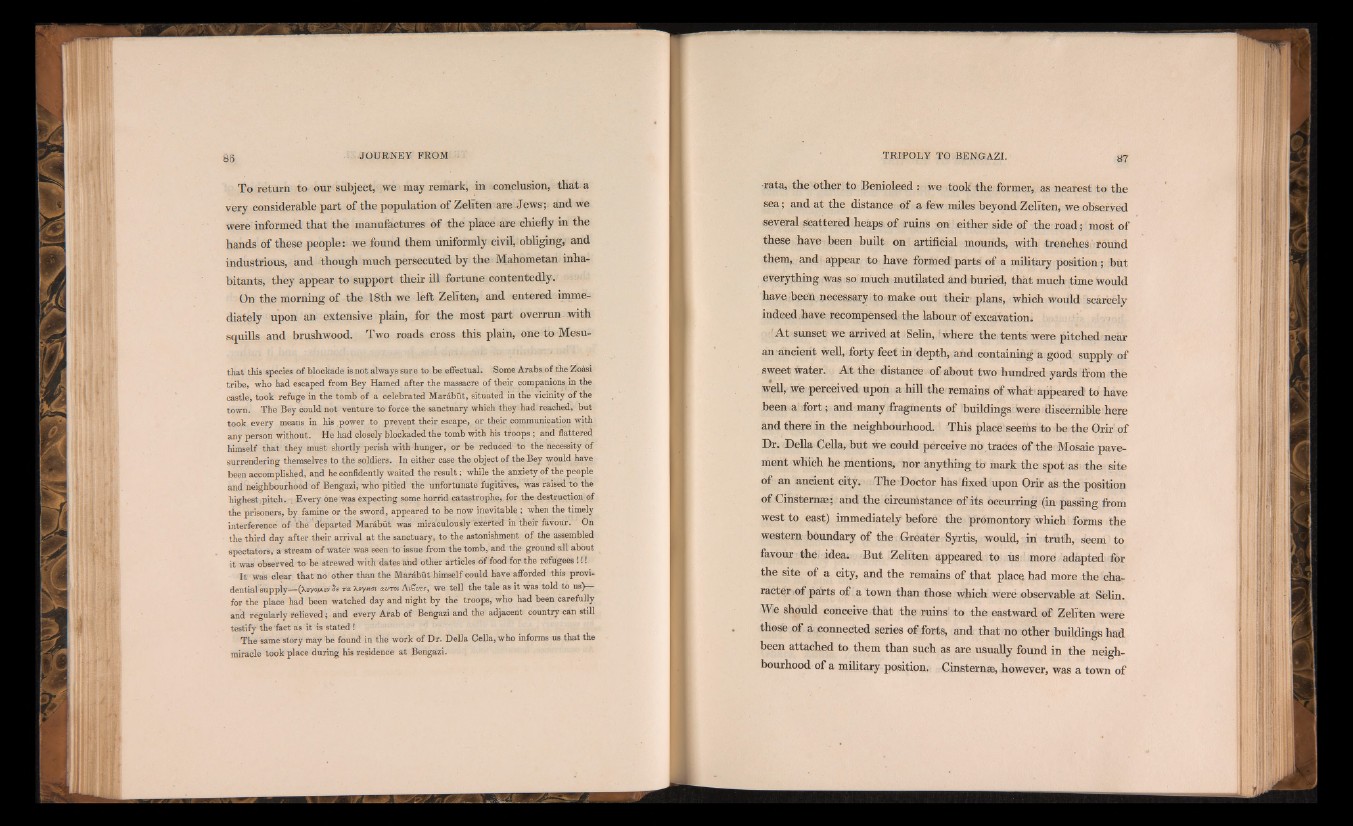
To return to our subject, we may remark, in conclusion, that a
very considerable part of the population of Zeliten are Jews ; and we
were informed that the manufactures of the place are chiefly in the
h a n d s of these people: we found them uniformly civil, obliging, and
industrious, and though much persecuted by the Mahometan inhabitants,
they appear to support their ill fortune contentedly.
On the morning of the 18th we left Zeliten, and entered immediately
upon an extensive plain, for the most part overrun with
squills and brushwood. Two roads cross this plain, one to Mesuthat
this species of blockade is not always sure to.be effectual. Some Arabs,of the Zoàsi
tribe, who had escaped from Bey Hamed after the massacre of their, companions, in the
castle, took refuge in the tomb of a celebrated Maràbüt, situated in the vicinity of the
town. The Bey could not venture to force the sanctuary which they .had:reache'd, but
took every means in his power to prevent their escape, or their communication with
any person without. He had closely blockaded the tomb with his troops,; and flattered
himself that they must shortly perish with hunger, or be reduced to the necessity of
surrendering themselves to the soldiers. In either case the object of the Bey would have
been accomplished, and he confidently waited the result ; while the anxiety of the people
and neighbourhood of Bengazi, who pitied the Unfortunate fugitives, was raised to the
highest pitch. -, Every one was expecting some horrid catastrophe, for .the destruction; pf
the prisoners, by famine or the sword, appeared to be now inevitable ; when the timely
interference of thd departed Maràbüt was miraculously ùxéfted in their favour. On
the third day after their arrival at the sanctuary, to the astonishment of the assembled
spectators,' a stream of water was seen to issue from the tomb, and the ground all'about
it was observed to be strewed with dates and other articles of food for the refugees ! !■!
It was clear that no other than the Maràbüt himself could Have afforded this providential
supply^—(Xeyoixev 1e t % \ e y a 6 t olvtoi A i f i s i , we tell the tale as it was told to us)
for the place had been watched day and night by the troop, who had been carefully
and regularly relieved ; and every Arab of Bengazi and the adjacent country can still
testify the fact as it is stated 1
The same story may be found in the work of Dr. Della Celia, who informs us that the
miracle took place during his residence at Bengazi.
-rata, the other to Benioleed : we took the former, as nearest to the
sea; and at the distance of a few miles beyond Zeliten, we observed
several scattered heaps of ruins on either side of the road; most of
these have been built on artificial mounds, with trenches round
them, and appear to have formed'parts of a military position ; but
everything was so much mutilated and buried, that much time would
have been necessary to make out theft plans, which would scarcely
indeed, have recompensed the labour of excavation.
At sunset we arrived at Selin, ‘where the tents were pitched near
an ancient well, forty feet in depth, and containing a good supply of
sweet water. At the distance, of about two hundred yards from the
well, we perceived upon a hill the remains of what appeared to have
been a fort; and many fragments of buildings were discernible here
and there in the neighbourhood. This place seems to be the Orir of
Dr. Della Celia, but we could perceiye no traces of the Mosaic pavement
which he mentions, nor anything to mark the spot as the site
of an ancient city. The Doctor has fixed upon Orir as the position
of Cihstem® ; and the circumstance of its occurring (in passing from
west to east) immediately before the promontory which forms the
western boundary of the Greater Syrtis, would, in truth, seem to
favour the idea. But Zeliten appeared to us more adapted for
the site of a city, and the remains of that place had more the character
,of parts of a town than those which were observable at Selin.
We should conceive that the ruins to the eastward of Zeliten were
those of a connected series of forts, and that no other buildings had
been attached to them than such as are usually found in the neighbourhood
of a military position. Cinsternee, however, was a town of